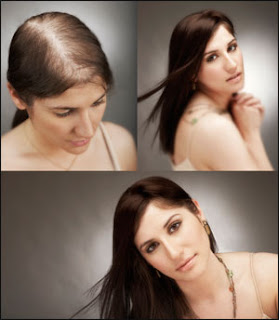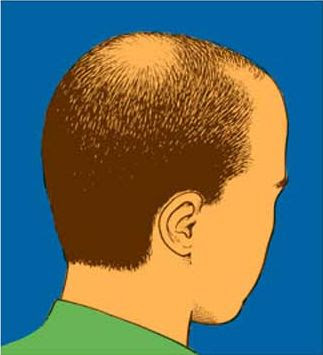Hair loss is a common, emotionally devastating experience in life because it affects the majority of people at one time or another in their lives. Many men are suffering baldness in silence because they are afraid to admit their undue concern over their hair; women are more traumatized than men because their hair loss is often perceived as abnormal by society.
To treat your hair problem, you must understand some of the basics of human hair. Your hair itself is made up of dead cells, although your hair follicles are alive. An average person has approximately one hundred thousand hair follicles, which grow more in spring and less in winter. Normal hair loss is between 50 and 100 strands per day. Do not be over concerned if you find many strands of hair after your shampoo, or on your pillow when you wake up in the morning.
There are different types of hair loss, which can be temporary or long lasting. Temporary loss of hair can be fixed as long as its causes are identified. Unfortunately, early and correct diagnosis is not easy: many symptoms of different types of hair problems may overlap one another; a general practitioner or dermatologist may not be adequately trained in hair loss treatment.
Basically, abnormal or excessive loss of hair will occur due to hormone imbalance, disease, or other conditions such as stress, pregnancy, and medication.
Your hair loss may be directly or indirectly related to your diet.
Your testosterone levels affect hair growth and hair loss. Your testosterone peaks off in the fall and is lowest in the spring. That accounts for the fact that hair grows the most in spring. This is the normal cycle of hair growth and their demise.
Interestingly, Asian men have less body hair and baldness than Americans. The explanation is that the Standard American Diet (SAD), often loaded with fat and animal protein, tends to upset the blood sugar balance in the body, leading to excessive production of the male hormone, Dihydrotestosterone (DHT), which is an enemy of hair follicles on your head.
Similarly, when your body undergoes something traumatic, such as disease, childbirth, or stress, your body's hormone levels may become upset, causing problems in hair follicles.
Yes, your diet does play a pivotal role in your hair loss. Sugar is a contributing factor to hormone imbalance, which is the root of most kinds of hair loss. The delicate imbalance of male and female hormones is critical to the problems in hair follicles.
Your body converts food and its nutrients into glucose, a sugar, which is used by the insulin in your body to make energy for your body's cells. Accordingly, foods affect your hormones, both short term and long term. Studies indicated that low-fat or vegetarian diets produce lower levels of testosterone in your bloodstream. In addition, a low-fat diet also reduces estrogen levels in both men and women. This explains why obese men have breast enlargement. Another explanation is that a high-fat diet reduces the amount of a certain sex hormone protein, keeping it inactive until your body needs it; more testosterone in your bloodstream means more follicle-killing DHT.
Yes, you can use diet to control your testosterone levels. According to Dr. Sears, author of "The Zone", you may consume a sugar-balancing diet made up of 30 percent protein, 40 percent complex carbohydrates, and 30 percent monounsaturated fat, such as extra virgin olive, almonds, avocados, and macadamia nuts.
Reduce your alcohol consumption to no more than one drink per day. Alcohol plays havoc with your sugar levels by depleting your body of vitamin c, zinc, and folic acid.
Also, limit your caffeine intake, which adversely affects your adrenal glands, and ultimately your DHT levels.
If you wish to keep your hair on your head a little longer, watch out what you put into your mouth.
Read more...
 Healthy hair is not always obtained with expensive treatment in the salon. Health research showed the healthy and shiny hair depends on the smoothness of blood circulation and nutrient intake. Hair health condition is also associated with a thyroid condition, liver and levels of stress. So, if you want to have beautiful hair also note nutrition.
Healthy hair is not always obtained with expensive treatment in the salon. Health research showed the healthy and shiny hair depends on the smoothness of blood circulation and nutrient intake. Hair health condition is also associated with a thyroid condition, liver and levels of stress. So, if you want to have beautiful hair also note nutrition.














